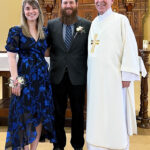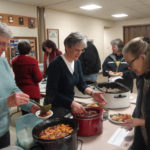On the last weekend of April, family members filled the pews for the baptism of a baby girl who chattered and smiled throughout the rite. Children received Eucharist for the first time in parishes large and small and teenagers invited the Holy Spirit into their lives during the sacrament of confirmation. For the moment, these young Catholics are traveling on what we pray will be a lifelong journey of faith as members of the church. As role models, how will we encourage and guide these young Catholics so that they don’t choose to drop out and join the growing population of disaffected adults called “nones”?
In 2014, nearly 23 percent of U.S. adults identified as “nones,” individuals who are religiously unaffiliated. Yet, nearly 80 percent of them say they were raised within a particular religious tradition. Furthermore, Catholics are among segments of Christian populations that experienced the largest loss in numbers, according to studies released in 2016 by the Pew Research Center and by The Center for Applied Research in the Apostolate (The Catholic World Report, Feb. 23, 2017).
Youth ministry expert Robert Feduccia, who presented a workshop last month in Iowa City (see Page 1 story), calls for a multipronged approach to passing on the faith. We need to help people at a younger age to discern God’s actions in their lives. We need to offer them liturgy that inspires them to be full, conscious and active participants in the church.
Our young Catholics desire role models to accompany them on the journey and a deepening awareness of Christ acting in their lives. We, their “faith formers,” must show and tell how Christ is working in our lives. “If you see how God is working in your life, you can do the same with others and help them say yes to God,” says Feduccia who founded the Youth Liturgical Leadership Program One Bread, One Cup at Saint Meinrad Seminary and School of Theology.
Our parishes would benefit from self-assessment. How are we responding to changes in our world, our culture and the impact on young Catholics? “The models and practices we employ that served us well are not yielding the same results,” notes Don Boucher, diocesan director of the Office of Faith Formation.
Some doable ideas:
• Invite parish faith formers (all of us, really) to reflect on their faith stories and to remember why they got into faith formation in the first place. Sharing stories fosters a contemplative view, one that demonstrates God is active in our lives.
• Building community must be a priority. Attend Mass regularly; participate in the sacraments. Choose to attend a parish event or Bible study. Offer to pray for and with one another. Join the parish prayer chain. Invite others to pray before the Blessed Sacrament at the church.
• Celebrate the liturgy well: beauty attracts. People can tell when the liturgy is more about the minister than about worshipping God, observes Deacon Frank Agnoli, diocesan director of Liturgy.
• Preach in a way that speaks to all parishioners, including our youths. As Pope Francis wrote, preachers “should never respond to questions that nobody asks” (Evangelii Gaudium, 155).
• Encourage daily, personal prayer. Catholics under the age of 40 are less likely to pray daily, Feduccia says. Share prayer cards with them or post favorite prayers on social media.
• Young Catholics who have had a religious experience may not know how to make sense of it. Listen to them; help them to discern God’s actions in their lives.
• Invite young people to get in touch with their faith story. Youths need to feel safe in sharing their stories, and trust that adults will hold their story as sacred as they do.
• Don’t be motivated by trying to stop ones from becoming nones. Be motivated by a desire to walk with young people and help them to have an encounter with the living Jesus.
• Examine what models and practices work in faith formation classes. Let go of those that don’t work.
• Trust in the Holy Spirit. In his April 30 Gospel reflection Bishop Robert Barron spoke of Jesus’ promise to send the Holy Spirit to inspire, strengthen and defend his followers. “This is the supporter, the Advocate who will inspire Christians up and down the ages.”
Barb Arland-Fye, Editor
(arland-fye@davenportdiocese.org)











